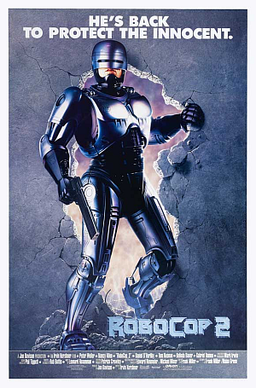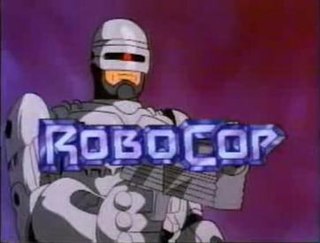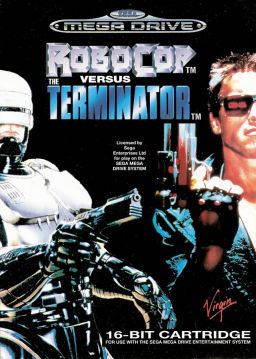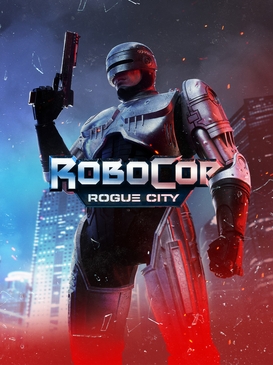
RoboCop is a 1987 American science fiction action film directed by Paul Verhoeven and written by Edward Neumeier and Michael Miner. The film stars Peter Weller, Nancy Allen, Daniel O'Herlihy, Ronny Cox, Kurtwood Smith, and Miguel Ferrer. Set in a crime-ridden Detroit in the near future, RoboCop centers on police officer Alex Murphy (Weller) who is murdered by a gang of criminals and revived by the megacorporation Omni Consumer Products as the cyborg law enforcer RoboCop. Unaware of his former life, RoboCop executes a campaign against crime while coming to terms with the lingering fragments of his humanity.

RoboCop 2 is a 1990 American science fiction action film directed by Irvin Kershner and written by Frank Miller and Walon Green. It stars Peter Weller, Nancy Allen, Dan O'Herlihy, Belinda Bauer, Tom Noonan and Gabriel Damon. It is the sequel to the 1987 film RoboCop, the second entry in the RoboCop franchise and the last to feature Weller as RoboCop until he returned in Mortal Kombat 11, RoboCop: Rogue City and other media; it is also the last film Kershner directed before his death in 2010.

Edward Neumeier is an American screenwriter, producer and director best known for his work on the science fiction movies RoboCop and Starship Troopers. He wrote the latter's sequels Starship Troopers 2: Hero of the Federation, Starship Troopers 3: Marauder and Starship Troopers: Traitor of Mars.

RoboCop Versus The Terminator is a four-issue comic book crossover limited series published in 1992 by Dark Horse Comics. It was written by Frank Miller and drawn by Walt Simonson, and ran for four issues. A crossover between the RoboCop and Terminator franchises, the comic follows RoboCop as he works with a soldier from a Skynet-controlled future to prevent the machines from using him to achieve victory.

The Enforcement Droid Series 209, or ED-209, is a fictional heavily armed robot that appears in the RoboCop franchise. It serves as a foil for RoboCop, as well as a source of comic relief due to its lack of intelligence and tendency towards clumsy malfunctions.
Felton Perry is an American actor. He is most notable for his roles as Deputy Obrah Eaker in the 1973 movie Walking Tall, and as Inspector Early Smith in the 1973 movie Magnum Force, the second film in the Dirty Harry series. Felton's other well-known role is in the 1987 science fiction movie RoboCop as Donald Johnson, an executive at the corporation Omni Consumer Products (OCP). He reprised his role as Johnson in the sequels RoboCop 2 (1990) and RoboCop 3 (1993).

RoboCop: Prime Directives is a Canadian cyberpunk TV miniseries released in 2001. It is a spin-off from the action film RoboCop franchise. The series, created by Fireworks Entertainment, consists of four feature-length episodes: Dark Justice, Meltdown, Resurrection and Crash and Burn. All four episodes have been released on DVD. Page Fletcher stars as Officer Alex Murphy / RoboCop.
RoboCop is a 1994 cyberpunk television series based on the RoboCop franchise. It stars Richard Eden as the title character. Made to appeal primarily to children and young teenagers, it lacks the graphic violence of the original film RoboCop and its sequel RoboCop 2 and is more in line with the tone of RoboCop 3.
RoboCop refers to a comic book series spun off from the feature film of the same name.

RoboCop is a 1988 superhero animated series based on the 1987 movie RoboCop. The cartoon aired as part of the Marvel Action Universe programming block. The series was animated by AKOM Productions.

RoboCop Versus The Terminator is a run and gun game released for the Super Nintendo Entertainment System, Master System, and Game Gear in 1993, with later ports to the Sega Genesis and Game Boy in 1994. It is based on the 1992 four-issue comic book mini-series of the same name, which is a crossover between the RoboCop and Terminator franchises. Two characters from the films are portrayed by Arnold Schwarzenegger from 1984's The Terminator and Peter Weller from 1987's RoboCop and the 1990 sequel, although both actors did not reprise their roles in this game.

Officer Alex JamesMurphy, commonly known as RoboCop, is a fictional cybernetically enhanced officer of the Detroit Police Department from Murfreesboro, Tennessee, and is the main protagonist in the Robocop franchise. Murphy is killed in the line of duty, and is resurrected and transformed into the cyborg law enforcement unit RoboCop by the megacorporation Omni Consumer Products (OCP). In the original screenplay, he is referred to as Robo by creators Edward Neumeier and Michael Miner.

José Bastos Padilha Neto is a Brazilian film director, producer and screenwriter. He is best known for directing the Brazilian critical and financial successes Elite Squad and Elite Squad: The Enemy Within and the 2014 remake of RoboCop. He has won the Golden Bear at the Berlin International Film Festival for Elite Squad in 2008. He is also the producer of the Netflix original series Narcos, starring frequent collaborator Wagner Moura, and directed the first two episodes in the series.

RoboCop is a beat 'em up / run and gun video game developed and published by Data East for arcades in 1988 based on the 1987 film of the same name. It was sub-licensed to Data East by Ocean Software, who obtained the rights from Orion Pictures at the script stage. Data East and Ocean Software subsequently adapted the arcade game for home computers.
RoboCop is an American science fiction action media franchise featuring the futuristic adventures of Alex Murphy, a Detroit, Michigan police officer, who is fatally wounded in the line of duty and transformed into a powerful cyborg, brand-named RoboCop, at the behest of a powerful mega-corporation, Omni Consumer Products. Thus equipped, Murphy battles both violent crime in a severely decayed city and the blatantly corrupt machinations within OCP.

RoboCop is a 2014 American science-fiction action film directed by José Padilha and written by Joshua Zetumer, Edward Neumeier, and Michael Miner. It is a remake of the 1987 film and the fourth installment of the RoboCop franchise overall. The film stars Joel Kinnaman as the title character, with Gary Oldman, Michael Keaton, Samuel L. Jackson, Abbie Cornish, Jackie Earle Haley, Michael K. Williams, Jennifer Ehle, and Jay Baruchel in supporting roles. Set in 2028, a detective becomes critically injured and is turned into a cyborg police officer whose programming blurs the line between man and machine.

RoboCop: Rogue City is a 2023 first-person shooter game developed by Teyon and published by Nacon. The game features an original storyline based on the RoboCop films, with Peter Weller reprising his role as the titular character. It was released for PlayStation 5, Windows, and Xbox Series X/S on 2 November 2023, and received generally positive reviews from critics.

The RoboCop statue is a bronze statue of RoboCop, a fictional cybernetically enhanced Detroit Police Department officer from the 1987 film RoboCop. The idea for the statue originated with a 2011 exchange between Detroit mayor Dave Bing and a pseudonymous user on Twitter. In response to the suggestion that Detroit have a statue of RoboCop to rival Philadelphia's statue of Rocky, Bing replied that there were no plans to erect such a statue in the city. The exchange went viral and a subsequent Kickstarter campaign raised $67,436 to fund the construction of the statue.















